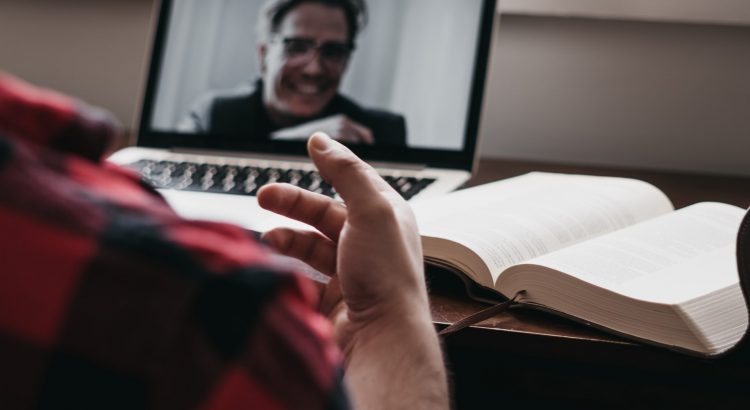Podcast: Play in new window | Download
Subscribe: Spotify | Email | TuneIn | RSS
The letters of recommendation have been submitted, and review committees have assembled. But while this graduate school application season may seem familiar, the next steps will be wildly different from past years.
How will Universities conduct graduate school interviews during a pandemic?
And what can applicants do to prepare for these unprecedented times?
Virtual Interview
Interviews are always nerve-wracking. And for graduate school they’re especially complex.
You typically take a 3-day weekend, fly to a new city, sit through orientations, seminars, faculty interviews, campus tours, dinner meetings, and social events.
Then a week later, you do it all again with a different University in a different city!
But this year, as COVID-19 infections spike in fall and winter months, those anxiety-inducing interviews will get, well, weirder.
This week, we talk with Dr. Beth Bowman, Assistant Director of Graduate Programs in Biomedical Sciences at Vanderbilt University in Nashville, Tennessee.
You may remember Dr. Bowman from our conversations about how to craft an application and how to ace your interview. Well, she’s back with more information on what to expect this year when you’re invited for a virtual interview.
Most of the previous advice still applies:
- You need to understand your science, and be able to talk about it.
- You should take a quick look at the research websites or paper abstracts from your interviewers so you’re at least familiar with the field they’ll speak about.
- You should ask lots of questions to get a feel for the University, the city, the research, and student life.
What’s different will be wildly different. You won’t get a campus tour. You won’t have much opportunity for side conversations with current students or other applicants to trade gossip or interview experiences.
And you’ll be spending a lot of time on Zoom.
So… much… time…
And that’s where Dr. Bowman advises you to prepare with some very practical tips
Make Time
There’s no sugar-coating this: you’re going to be on video conference calls for hours at a time, and you need to be ready for it.
Some programs are looking for ways to break up the monotony by scheduling interviews over two afternoons. But whatever happens, you’ll need to combat Zoom Fatigue.
First, do what you can to clear your schedule. Because you’re not actually traveling, you’ll be tempted to sneak in a little work in the lab.
Fight that urge, and let your lab-mates know it’s an interview weekend and you’ll be unavailable.
If you have other video-conferences, try to cancel them or sit them out. Missing a few journal clubs or research seminars is not the end of the world, and it might save your sanity.
Make Space
Remember that thing about not being in the lab? That applies here too!
Some students don’t have great internet, or a quiet space without roommates, pets, or that guy who plays drums on the fourth floor. If that’s your situation, you may want to seek out a space ON campus, but not IN lab.
Borrow an office or book a conference room. Find somewhere quiet, comfortable, and non-distracting.
The goal here is to make the space for a conversation, and the more you can eliminate distractions, the better that conversation will be.
Which brings us to our next point…
Bring Focus
With an in-person interview, you bring your whole body to the conversation. You sit in a room, across a table, and maybe share documents or data slides.
But Zoom lives on a computer. And it lives in the same computer where you keep your email, Twitter account, Instagram, and game of Candy Crush that you’re seriously just about to beat!
Do what you can to close those programs, shut off notifications, and focus on the task at hand. Align your computer screen so that your camera is near the video of the other person, so that your eyes will naturally look in their direction.
And to maintain that focus, use your breaks to move around, walk outside, get a drink of water, or destress in your own way. Don’t use that time to set up a new experiment or to sit in your chair for another 30 minutes until the next meeting starts.
Be Yourself
The good news is that graduate school interviews are typically not a game of gotcha where faculty try to eliminate students with impossible questions.
They’re a good-faith effort to get to know you. To understand the work you’ve done so far, and what you hope to do in the future.
And they’re an effort to connect you with space, resources, and people that will help you achieve those goals.
That’s why these conversations are so important, and why this process can still happen during a pandemic when we can’t gather together in the same place.
Yes, it’s going to be tough to choose a program if you can’t visit the city, but graduate school is a stepping stone, not a destination.
And if you can make a solid connection to a supportive program during this virtual interview, you’ve taken that first important step toward a PhD.
Learn More
To hear more from Dr. Bowman, check out her blog focused on grad-school applications and beyond!
Or check out these previous episodes:
106: HelloPhD Guide to Grad School Applications – Acing Your Interview with Dr. Beth Bowman
131. How to Host a Dissertation Defense On Zoom

